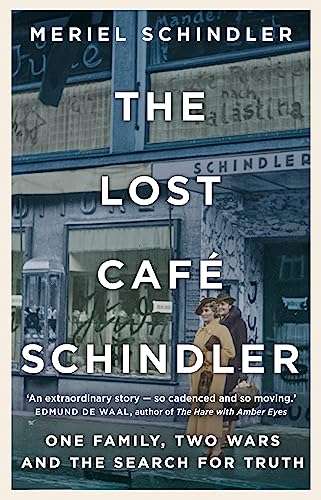Published by Hodder & Stoughton, 2021, illustrated, 408 pages, condition: as new.
Kurt Schindler was an impossible man. His daughter Meriel spent her adult life trying to keep him at bay. Kurt had made extravagant claims about their family history. Were they really related to Franz Kafka and Oscar Schindler, of Schindler's List fame? Or Hitler's Jewish doctor - Dr Bloch? What really happened on Kristallnacht, the night that Nazis beat Kurt's father half to death and ransacked the family home?
When Kurt died in 2017, Meriel felt compelled to resolve her mixed feelings about him, and to solve the mysteries he had left behind.
Starting with photos and papers found in Kurt's isolated cottage, Meriel embarked on a journey of discovery taking her to Austria, Italy and the USA. She reconnected family members scattered by feuding and war. She pieced together an extraordinary story taking in two centuries, two world wars and a family business: the famous Cafe Schindler. Launched in 1922 as an antidote to the horrors of the First World War, this grand cafe became the whirling social centre of Innsbruck. And then the Nazis arrived. Through the story of the Cafe Schindler and the threads that spool out from it, this moving book weaves together memoir, family history and an untold story of the Jews of the Austro-Hungarian Empire. It explores the restorative power of writing, and offers readers a profound reflection on memory, truth, trauma and the importance of cake.
Lawyer and author Meriel Schindler has a stunning family history! She scrutinized and sorted the papers in dozens of boxes in addition to thirteen photo albums her father Kurt kept and left upon his death in 2017. She also travels to discover more. What is so intriguing about this documentation and further research (interviews, newspapers) is what it represents, before WWI and during the Nazi era. This powerful book about her Jewish family is the result. To say the author grew up in a confusing environment is an understatement. She details her experiences as a young girl, though most of the story is about her ancestors. This book includes personal photographs, illustrations and even recipes from the beloved Cafe Schindler which was originally owned by her Jewish family in Innsbruck. Amongst my favourite photographs are those of the author walking to her house and her great grandmother engrossed in a book on a bench. But there are many more. Posters are remarkable, too. And the coffee cups!
Jews, "dangerous parasites", suffered through unimaginable anguish in this era in Europe and the Schindlers were heavily impacted. They were forced to leave their dear cafe, distillery, factory and lives. Reading about Dr. Eduard Bloch and one of his patients in particular is absolutely riveting (what a family resemblance!). Hitler connections are detailed as are terrifying house searches, propaganda, a secret escape tunnel, Kristallnacht, family rows, Richenau labour camp and execution. There is even a timeline of Germany's occupation of Austria, hour by hour.

